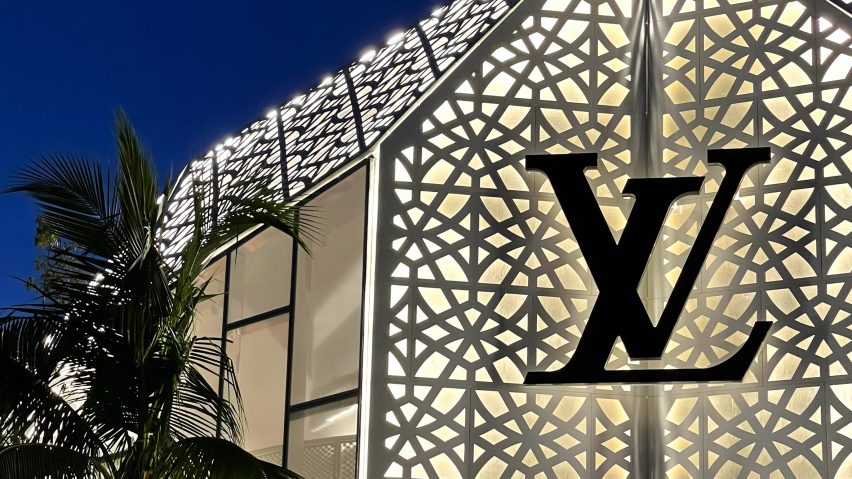Dutch studio Marcel Wanders has created a white patterned facade for a Louis Vuitton menswear store in Miami that was informed by the luxury brand's leatherwork and iconic monogram.
Located in the heart of the city's Design District, the store opened in December 2021 during the Design Miami fair.
While the building and interior design were handled by the company's in-house team, Amsterdam-based Marcel Wanders Studio created the exterior screen, dubbed the Diamond Facade.
In addition to Miami's modernist architecture, the design draws upon an earlier product created by Marcel Wanders for Louis Vuitton – the Diamond Screen room divider, which is part of the brand's Objet Nomades collection. The partition was unveiled in 2017.
"At that time, we wanted to create, from a single hexagonal module, a standing room divider, as well as an entire hanging modular system that could be used as an interior feature for the LV store," said Gabriele Chiave, the design studio's creative director.
To conceive the module, the studio assessed the qualities comprising the LV brand and zeroed in on its leather craftsmanship – in particular, the leather straps on its iconic bags.
"With these straps, we began to explore shape to create a module," the studio said. "This is how the hexagonal module found in the pattern was created."
"It also refers to the Louis Vuitton star monogram in very elegant and subtle way," the studio added.
A series of modules were then connected with brass clips, similar to those found on Louis Vuitton bags and trunks, and the Diamond Screen was born.
"To summarise, starting with a bag strap, we created a module, which became a room divider, which then became a broader interior feature, and finally a large-scale architectural facade," the team said.
To construct the building screen, the team used laser-cut metal plates that are welded together. The panels are coloured white, which relates to the character of Miami and gives the store a fresh look, the team said.
Rather than being a flat surface, the screen has a sculptural form, with several projecting window boxes that extend over the sidewalk below. This dynamic shape enhances the pattern and creates a sense of movement, said Chiave.
There is a 30-centimetre gap been the screen and the building's exterior wall, which results in an interesting play of light and shadow.
"When sunlight hits the building, the shadow of the metal facade drops into the wall, creating a shadow effect of the pattern," said Chiave. "This shadow creates a beautiful illusion of depth, or second skin."
At night, the building is brightly illuminated by internal light sources, which also produces a sense of depth.
This facade is the latest iteration of the Diamond Screen pattern. Louis Vuitton has used the design as partitions and backdrops in permanent stores and temporary installations.
"Because of the essence of this pattern being rooted in the iconic Louis Vuitton monogram, as well as its connection to the beautiful leatherwork of the brand, it has become a relevant symbol for the conceptual visual communication of the brand," said Chiave.
The Miami store is the French fashion house's second freestanding menswear boutique, the other being in Tokyo. The artistic director of Louis Vuitton's menswear line was Virgil Abloh, who died last November of cancer at the age of 41.
Other Louis Vuitton locations include an Amsterdam boutique by UNStudio that
has bricks made of stainless steel and glass, a Seoul shop by Frank Gehry that is topped with sweeping glass "sails", and a Tokyo flagship store by Jun Aoki & Associates that has an undulating, pearlescent facade.
The photography is by Marcel Wanders Studio.

